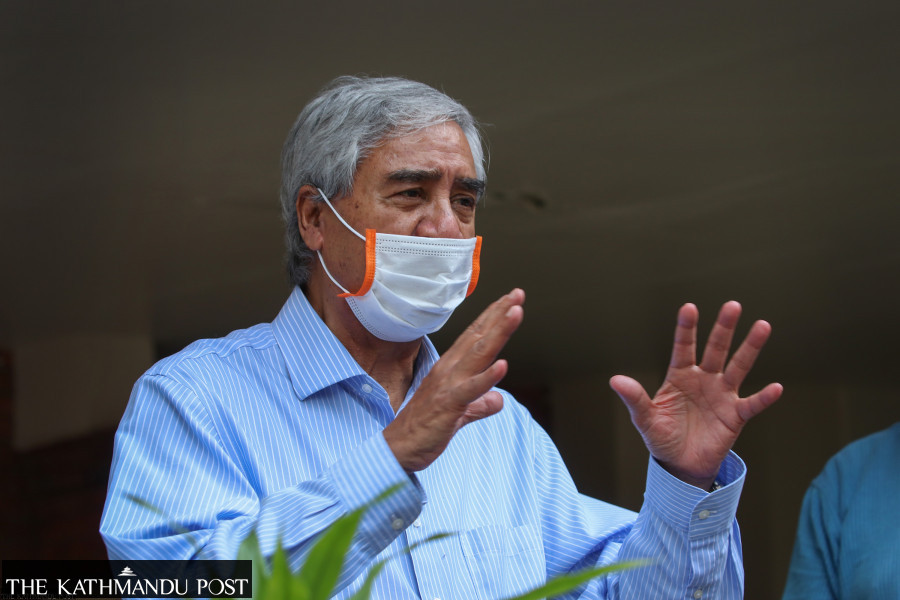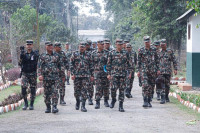National
Deuba assures coalition leaders he won’t sign SPP
The prime minister says he won’t sign any agreement that could bring harm to the country.
Post Report
Prime Minister Sher Bahadur Deuba has assured the coalition leaders that he will not sign any agreement that could do harm to the country.
“I won’t do any such thing which could bring harm to the country,” Ramesh Malla, chief personal secretary to the CPN (Maoist Centre) chair Pushpa Kamal Dahal, quoted the prime minister as telling the coalition leaders during their meeting on Wednesday. “The prime minister has assured the coalition partners that the government will not sign the US-proposed State Partnership Program (SPP).”
Washington’s SPP has now become a politically charged issue after some reports suggested that signing it could pave the way for the US to make Nepal part of a military alliance.
Lawmakers have been demanding that the prime minister offer clarification on the matter.
During his meeting with Dahal and Madhav Nepal, chairman of CPN (Unified Socialist), at the prime minister’s residence at Baluwatar on Wednesday morning, Deuba had told the leaders that the US had asked Nepal to join the State Partnership Program.
Speaking in Parliament, Nepali Congress General Secretary and lawmaker Gagan Thapa demanded that the prime minister should tell Parliament that the government will not sign the SPP with the US government.
According to some Nepali Congress leaders close to Deuba, the prime minister has told the coalition partners that signing the State Partnership Program could affect the ruling coalition and bring the leftist parties together.
“The prime minister has told the coalition leaders that he won’t take any decision without consulting them,” said Min Bishwakarma, a Congress lawmaker close to Deuba.
UML lawmaker and former foreign minister Pradeep Gyawali told Parliament that his party will not accept the move aimed at thrusting the country into a geopolitical conflict in the name of the State Partnership Program.
Gyawali also demanded that the government clarify the issue.
The SPP issue has surfaced just ahead of the visits of Prime Minister Deuba and Chief of Army Staff General Prabhu Ram Sharma to the United States.
Gen Sharma is scheduled to visit the US at the invitation of the Pentagon from June 27 to July 1 while Prime Minister Deuba is visiting Washington in mid July, of which a formal announcement is yet to be made.
The first report on the Indo-Pacific Strategy released in 2019 by the Pentagon had mentioned that Nepal and Sri Lanka were recent entrants to the State Partnership Program.
The US first came up with the concept of the SPP in 1993 as a humanitarian and disaster response training programme.
When Nepal first requested the US government to become part of the SPP in 2015, Rajendra Chettri was the Nepal Army chief.
During the visit of US Assistant Secretary of Defense for Indo-Pacific Security Affairs Randall Schriver to Nepal in December 2019, the issue surfaced again.
During his meeting with Schriver, then defence minister Ishwar Pokhrel, who is also a senior leader of the CPN-UML, had communicated that Nepal was positive about joining the SPP.
On Monday, a document surfaced in the media detailing the plan to sign an agreement between the Nepal Army and the Utah National Guard of the United States stoking speculations that such a move could make Nepal part of a military alliance.
The US embassy in Kathmandu, however, has called the document “fake.”
“The document published by some online outlets purporting to be a military deal between the United States and Nepal is fake,” said the embassy. “By policy, the United States does not ask countries to join the State Partnership Program and only responds to requests for consideration.”
“The State Partnership Program is an exchange programme between an American state’s National Guard and a partner foreign country,” it added. “The US National Guard domestically supports US first responders in dealing with natural disasters, such as earthquakes, floods, and wildfires.”




 20.23°C Kathmandu
20.23°C Kathmandu













